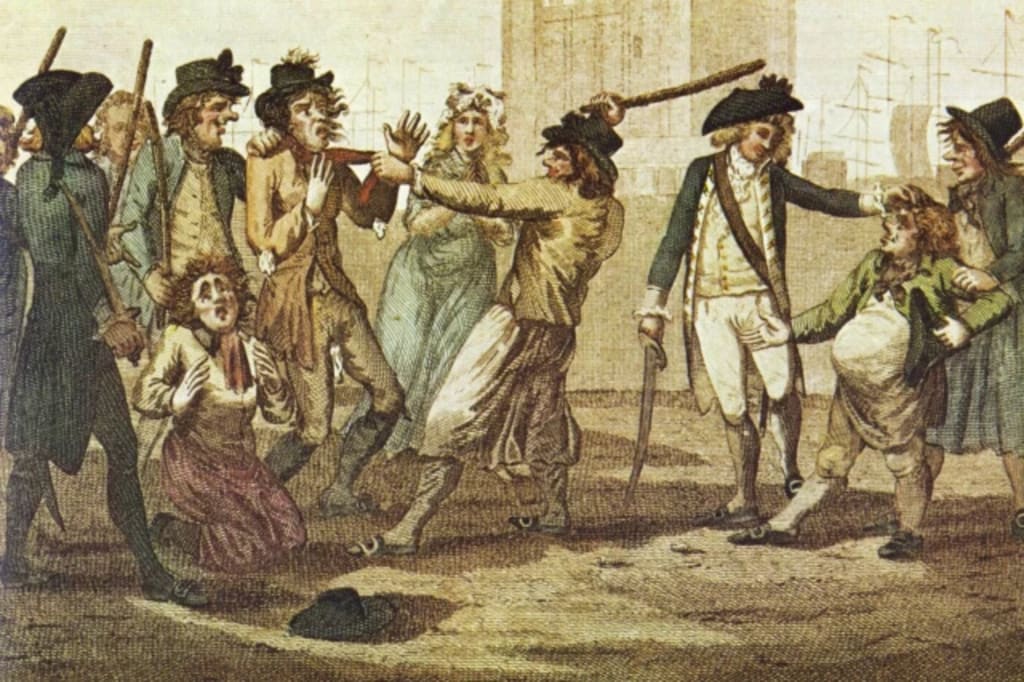The Impressive Reality
Beyond the Myths of Royal Navy Press Gangs

Introduction
During the late 18th and early 19th centuries, Britain found itself embroiled in near-constant warfare with France under Napoleon. This posed immense challenges for manning the Royal Navy, which relied on volunteers but struggled to attract sufficient numbers. As a result, the controversial practice of impressment - forcibly conscripting men into service - was established. Through primary sources and personal accounts, this article seeks to separate fact from fiction and gain a more nuanced understanding of how and why this system operated.
The Pressing Need
By the 1790s, the Navy's manpower demands had grown drastically to match Britain's expanded naval commitments globally. However, offering sufficient incentives to incentivize voluntary enlistment proved too heavy a burden on taxpayers. Though initially reluctant to abandon the longstanding tradition of voluntary service, impressment was legalized in 1793 as an "auxiliary method" for finding crews. It permitted boats or gangs - known as 'press gangs' - to board merchant ships and any other vessels, as well as venture onto shore to capture any eligible men.

Regulations and Resistance
While propaganda often cast press gangs as unrestricted there were, regulations aimed at curbing abuses. Only unmarried Englishmen between 18 to 35 years old without parental dependents could be pressed. Specific professions, including apprentices, ministers or men disabled/unfit for duty were exempt. Gangs carried Admiralty-issued warrants and were compelled to provide advance payment to those impressed. However, many men resisted, utilizing tricks like injuring themselves or bribing press gangs to be left alone. Public opposition also arose concerning forced conscription as a violation of civil liberties.
Life Before the Press
Personal accounts provide insight into the lives abruptly disrupted by impressment. One such example comes from London labourer Thomas Davis, who wrote of his experience in 1795:
"I had a good situation as a journeyman cordwainer, living with my wife and children near the docks. One evening while at the pub, four rough men dragged me outside - I soon found myself stripped and aboard a waiting naval cutter bound for Portsmouth".
Davis' story was far from unique. Sailors, dockworkers and other maritime trades populated the frequent press-gang raids along coasts. Life afloat promised none of the stable comforts many impressed men had known, replaced instead by unpredictability and hardship in His Majesty's service.
Methods and Memoirs
To find fresh recruits, gangs employed spies to identify dockyard workers or frequented pubs thought to shelter deserters. Boarding merchant ships under the veil of darkness, they scoured crews for any who failed to produce exemption papers. The impression often dissolved into brawls as men resisted with clubs or cutlasses. Personal accounts offer chilling first-hand perspectives. Charles Nordhoff describes being "seized like a felon" in 1809 aged just 16 while walking alone near Liverpool docks. But naval veteran William Spavens recalled more cooperative captures, writing "we avoided needless violence, using persuasion and bribery where we could."

Service and Sacrifice
Life aboard a warship came with its challenges for impressed men. Harsh discipline and threats of illness loomed alongside charges of idleness from naval officers unused to conscripts. Still, some grew to see service as an honour. Scottish impressed seaman Andrew Gibson wrote proudly of fighting at the Glorious First of June naval engagement in 1794, where his ship helped defeat the French.
"Though I was an unwilling recruit at the start, the comradery of my shipmates and a chance to strike a blow for Britain against Boney made me feel invested in our cause," records Gibson. Examples, like his showed even the involuntary, could find purpose in defending the king and country amidst the hardship.
Reforms and Remembrance
Gradually, impressment became outdated. Volunteers increased as service conditions and pay were improved in the early 19th century. Public opinion shifted further as naval recruitment moved on from the unregulated practices associated with wartime instability. The last major impressment took place in 1814 during the War of 1812 with America. Thereafter, impressment was phased out and abolished fully for peacetime in 1835.
Its legacy remains complex. Personal accounts show the reality to be far more nuanced than the “black legend” implies. However, the hardships faced through enforced conscription also left an indelible mark on maritime communities and British civil liberties. As a controversial but crucial chapter in naval history, analysis of press gangs rewards reexamining with a balanced perspective.
Conclusion
While forcibly conscripting men was understandably unpopular, regulations worked to curb abuses and narratives from impressed sailors themselves reveal the diversity of experiences. Service could come to be seen as a source of pride for some, despite the difficulties.
As naval needs evolved and conditions aboard ships gradually improved, impressment became increasingly outdated and alternative recruitment methods developed that respected civil liberties to a greater degree. Its eventual abolition demonstrated how even controversial policies implemented during emergencies may transform or be reformed with time. Overall, pressing thousands of men into service inevitably disrupted livelihoods but was also critical in defending Britain from the existential threat posed by Revolutionary and Napoleonic France. Only through considering multiple perspectives on this complex issue can we gain proper insight into its impacts and imperatives. It is my hope this article has helped to separate fact from the propaganda of the fictionalized "black legend" surrounding Royal Navy press gangs.
About the Creator
Richard Clements
Unearthing the Mysteries of History, Crime, and the Unknown
Delve into the captivating world of history, crime, and mystery through factual writing. Explore the past, unravel human behavior, and solve enigmas.
Enjoyed the story? Support the Creator.
Subscribe for free to receive all their stories in your feed. You could also pledge your support or give them a one-off tip, letting them know you appreciate their work.






Comments
There are no comments for this story
Be the first to respond and start the conversation.